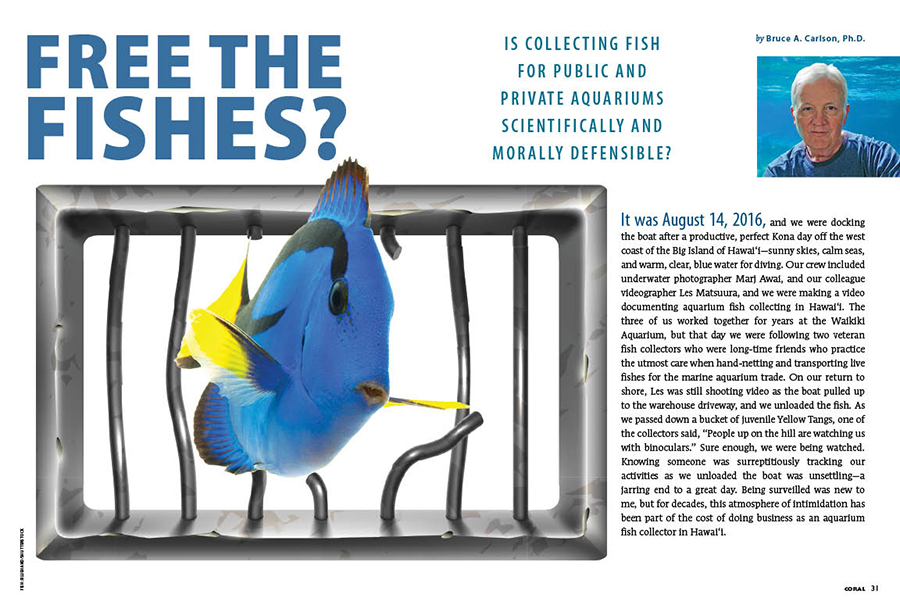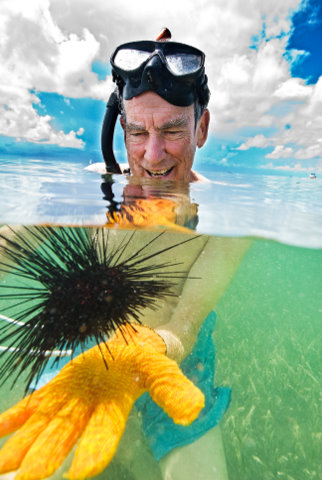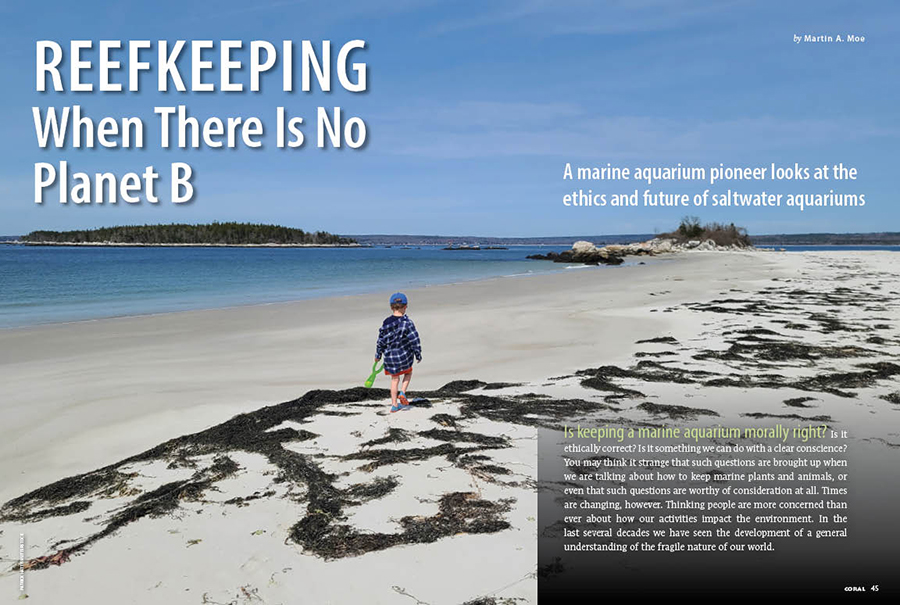
Dr. Bruce Carlson and Martin A. Moe, Jr., authored a pair of articles reflecting on the current state of the marine aquarium hobby and the industry that supports it; these articles were published in the May/June 2023 issue of CORAL Magazine. In what may well have been the last true “Letter to the Editor” received by CORAL’s Editor-in-Chief, the late James Lawrence, fellow aquarist, author, and contributor John Tullock reached out to share his reflections on the topics raised by Carlson and Moe. Both Carlson and Moe were also given the opportunity to reflect on Tullock’s letter.
We are grateful to continue their dialog here and welcome your comments.
-Matt Pedersen
Dear James and CORAL editors,

It was with great interest that I read the articles by Dr. Bruce Carlson and Martin Moe in the May/June issue of CORAL. Discussions regarding the sustainability and ethics of marine aquarium keeping have been around for 35 years at least, and it is noteworthy that similar arguments are put forth today as then.
It seems clear from the data presented in Dr. Carlson’s article that the impact of harvesting live aquarium fish—at least in Hawai’i—is minimal. That fishery can therefore be regarded as sustainable. As to Moe’s contention that marine aquarium keeping is morally justifiable, his arguments are plausible. It is easy to accept that the harvest of millions of fish for food has a greater impact than the harvest of a comparatively tiny number of fishes for the aquarium trade.
Kudos, therefore, to both of these gentlemen for their decades of effort leading to a more sustainable hobby.
If Florida and Hawai’i sourced all, or even the majority, of marine aquarium fish, it seems likely that organized opposition to the hobby/industry would evaporate. The United States accounts for approximately 60 percent of the market for marine aquarium fish, but those two states supply only a small fraction of the stock. The Philippines and Indonesia supply about 85 percent of the stock, and unfortunately unsustainable collection methods, primarily the use of cyanide, remain widespread in these areas. A reliable method for post-capture assessment of the use of cyanide to harvest aquarium fish remains elusive. Given the economic pressures associated with the collection of aquarium fish in Southeast Asia, it is likely that more than half of the harvest has been accomplished with the aid of cyanide, with consequences for the reef that have been well documented for many years.
For as long as these issues have occupied the interest of aquarium hobbyists and professionals, there has been a distinction between serious hobbyists and people who merely want a decorative item for the home. The number of aquarium owners who fall into the latter category is far greater than the number of those in the former. The economics of the marine aquarium trade being what they are, we can expect the merely decorative aquarium to dominate for the foreseeable future.
Those of us who would prefer to see the aquarium hobby and the trade associated with it continue, thanks to the undeniable benefits that these activities provide, are faced with a bit of a quandary. How can the activity be justified when clearly the largest share of its practitioners knows little of the science of marine aquariums and cares little to learn? Given that this lack of understanding has long been accepted as the primary reason millions of aquarium fish die needlessly and prematurely, can we honestly say that the environmental impact is minimal just because the impact of food fishing is vastly greater? What about the documented ecological harm resulting from the release (presumably by clueless aquarists or former aquarists) of lionfish into the waters of South Florida?
Clearly, the issues surrounding marine aquarium keeping are complex, and the number of stakeholders is large. With the economic clout engendered by its share of the market, the United States hobbyist/industry community is well-positioned to promote the reforms that nearly everyone seems to want. Yet, for decades those reforms have been either painfully slow in coming (ending cyanide fishing) or painful overkill (the ban on collecting in Hawai’i).

Setting the aquarium hobby/industry on a path to sustainability requires a coordinated effort, and that in turn requires a unified, authoritative organization involving stakeholder groups. To date, multiple attempts to establish such an organization have met with limited success. Even the most robust organization of marine aquarists in the United States, MASNA, sadly seems to be experiencing problems. A recent visit to the MASNA website reveals multiple vacancies in its leadership roster, and the annual MACNA event has been canceled for 2023 for reasons unspecified. Will MASNA join the list of other organizations, like the Marine Aquarium Council and the American Marinelife Dealers Association, established to effect positive change in the industry and now become sadly defunct?
I don’t have a ready answer to this question. Nevertheless, after three decades of watching efforts struggle and fail to bring the marine aquarium hobby/industry into a better attitude of care for our fragile planetary biosphere, I can only hope that we will try once again, will learn from our mistakes, and will finally achieve the outcomes that have so long been elusive.
-John Tullock
About the Author
John Tullock set up his first marine aquarium in the 1960s. His first fully-illustrated book, Natural Reef Aquariums, was developed at the behest of James Lawrence in the 1990s when they met at one of the early MACNAs. John is the author of ten books and hundreds of articles on both marine and freshwater aquariums. He is a founding member of the board of directors of Conservation Fisheries, Inc., a nonprofit that rears rare and endangered North American freshwater fishes for habitat restoration at its hatchery in Knoxville, Tennessee.
Response, from Dr. Bruce Carlson
John Tullock raises important issues that go beyond what I tried to address in my article. Where I focused primarily on the question of sustainability of the Hawaii aquarium fishery—the source of many fishes in the aquarium trade—John is looking at the big picture. He is asking us to focus on the whole story. Do the hobbyists who acquire the fish know what they are doing, and do they know or care how the fishes were collected?

He also asks, as did I, why there is no organization dedicated to ensuring that fishes are collected everywhere using sustainable and ecologically sound methods? And further, how do we deal with the massive environmental damage caused by aquarium releases, notably lionfish and Unomia [formerly Xenia, see report at Phys.org]? These are important issues that should be addressed and which go beyond what Martin and I covered in our essays. These issues are an important part of the whole story of the aquarium hobby.
But none of this is new; these issues have been bubbling like an aerator for decades and many of us have been reacting as best as we can to burst those bubbles. Given past events and experience, nothing much is likely to happen to resolve these issues until the day comes when legislation is on the horizon to shut down all imports and the hobby. By that time, it will be too late.
Thanks, John for keeping the spotlight shining on these important issues.
-Bruce Carlson
Response, from Martin A. Moe, Jr.
Well, I think the problems we face, aquarists, professionals, and everyone else; are far greater than the actual and presumed problems with the collection of marine fish and invertebrates for marine aquariums. In reference to this though, we should do all we can to protect what remains of coral reefs and other marine environments and humanity should “bite the bullet” that it will take to preserve marine and terrestrial environments all over the world.

In this day and time, most people in the developed world are separated from the natural environment. Our lives are surrounded by structures of concrete, the products of dead trees, and transparent glass, and when we do venture outside, the open areas we encounter are usually maintained with chemical weed killers. The living animals and plants that occupy our civilized lives are the products of many generations of genetic control designed to produce the animals that either blend into human cultures as pets or that produce food and/or materials for human life and progress. Aquariums, especially marine aquariums, are pretty much the closest most people come to interaction with animals and their native environments, and along with that, also a touch of the psychological calming that accompanies interaction with natural environments. Aquariums are valuable in psychological ways as well as for the enjoyment and satisfaction of creating a marine aquarium.
Aquarists; hobbyists, scientists, professionals, and industrials are all human. Marine aquaristics is not the largest of human ventures, but it is large enough to harbor almost all the vagaries and conditions of human nature and human culture within its broad scope. John Tullock, a friend of many years, in his letter, provided an excellent summary of the current state of the marine aquarium industry. Bruce Carlson, also a friend of many years, did an excellent review and perspective of the marine aquarium industry in the State of Hawaii, a major source of marine aquarium fish and a microcosm of the marine aquarium industry. His article extends from the biological science of collection and an important commercial source of marine aquarium fish to the difficulties and social interaction of opinions on the positive and negative aspects of the collection of marine fish for the aquarium industry.
We humans think and behave mostly on the basis of what we believe, and that includes what our culture collectively considers acceptable beliefs and behaviors. Often emotion supersedes fact, and often fact succumbs to belief. A rational and conservative approach to human interactions with nature also often succumbs to either the human error to destroy nature for survival and profit, and the human error to protect natural resources without concern for human needs. Obviously, for both the well-being of man and nature, a path, social and scientific should be found to protect nature and still provide for human needs.
However, I do need to add that the problems of the marine aquarium industry and hobby pale to insignificance when the present decline of the coral reefs and general oceanic and terrestrial decay due to climate change and aquatic and terrestrial human pollution are considered. It is not that we should ignore the positive and negative effects of the social and environmental effects of collection of marine aquarium fish. No, when these activities are done with consideration and regard to environmental protection, they are actually helpful in providing information on the severity of environmental degradation. Reports from those that frequent sections of the reefs can provide information on the success or failure to improve the health of coral reefs, which would be helpful to the science and the industry by providing a continuous professional view of the preservation or decline of coral reefs.
-Martin A. Moe, Jr.
What are your thoughts? Share them in the comments, below!





